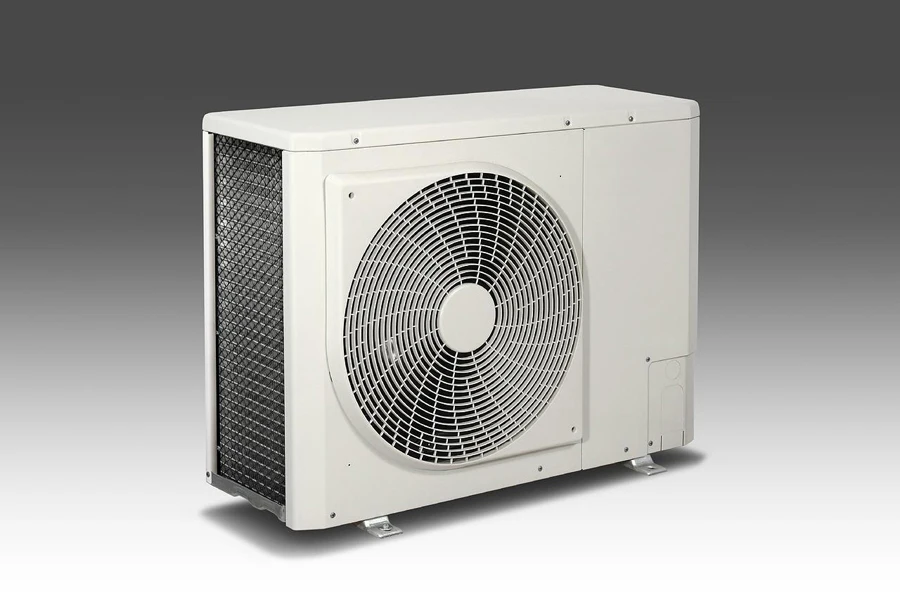Conteúdo
● Introdução
● Visão geral do mercado
● Principais inovações técnicas, de design e de materiais
● Os mais vendidos impulsionam as tendências do mercado
● Conclusão
Introdução
Air compressors are indispensable across numerous industries, powering essential tools and machinery. The market is experiencing significant growth, driven by technological advancements and a shift towards energy-efficient models. Innovations such as variable speed drives (VSD) and oil-free technology enhance performance and sustainability, making air compressors more efficient and environmentally friendly. Additionally, features like intelligent control systems allow for real-time monitoring and predictive maintenance, reducing downtime and operational costs. Noise reduction technologies are also becoming crucial, making these machines suitable for noise-sensitive environments such as hospitals and residential areas. Leading manufacturers, including Atlas Copco and Kaishan Compressor, are at the forefront of these developments, offering top-selling models that meet the evolving needs of various industries. These companies invest heavily in research and development to produce compressors that comply with stringent environmental regulations and provide superior performance and reliability. This article explores the current market trends, key design and technical innovations, and highlights the top-selling air compressors driving the industry’s future. By understanding these advancements, businesses can make informed decisions to enhance their operational efficiency and sustainability, ensuring they stay competitive in a rapidly evolving market.
Visão geral do Market
The global air compressor market was valued at USD 25.46 billion in 2023 and is projected to grow at a compound annual growth rate (CAGR) of 4.7% from 2024 to 2030, according to Grand View Research. This growth is driven by increasing demand across various industries, including manufacturing, healthcare, and food processing, which require efficient and reliable compressed air systems. Leading companies such as Atlas Copco, Ingersoll Rand, and Kaeser Compressors hold significant market shares due to their innovative products and strong global presence. The Asia-Pacific region, particularly China and India, is expected to see robust growth due to rapid industrialization and substantial investments in manufacturing infrastructure. North America and Europe also show significant market potential, emphasizing sustainability and compliance with stringent environmental regulations.
Regulatory changes and shifts in consumer preferences towards sustainable and energy-efficient models are significantly impacting market dynamics. Industries are adopting eco-friendly air compressors to reduce carbon footprints and operational costs. Additionally, there is a growing demand for oil-free compressors in sectors like food and beverage and pharmaceuticals, where air purity is essential. According to Grand View Research, the stationary air compressor segment led the market with a revenue share of 60.5% in 2023, while oil-free compressors are expected to witness significant CAGR growth due to their advantages, such as low contamination risk and reduced maintenance costs. These trends drive manufacturers to innovate, offering advanced, energy-efficient solutions that meet modern industrial applications’ stringent demands. The adoption of features like variable speed drives (VSD) and intelligent control systems is further enhancing performance and operational efficiency, solidifying the market’s growth trajectory.

Principais inovações técnicas, de design e materiais
The air compressor industry is witnessing remarkable advancements in design, technology, and materials, driving improvements in efficiency, reliability, and sustainability. These innovations are essential for meeting the evolving demands of various industries, from manufacturing to healthcare, where compressed air systems play a critical role. The following sections explore key innovations that are shaping the future of air compressors, enhancing their performance, and reducing operational costs.
Variable Speed Drives (VSD): Variable Speed Drives (VSD) technology allows air compressors to adjust motor speed based on real-time demand, significantly reducing energy consumption and operational costs. According to Grand View Research, VSD compressors can achieve energy savings of up to 35% compared to fixed-speed models. By optimizing motor speed, VSD compressors minimize wasted energy during periods of low demand, enhancing overall efficiency and reducing wear and tear on components, leading to longer equipment lifespan and lower maintenance costs.
Oil-Free Technology: Oil-free air compressors are increasingly favored in high-purity applications such as pharmaceuticals, food processing, and electronics manufacturing. These compressors eliminate the risk of oil contamination, ensuring that the compressed air is clean and suitable for sensitive environments. According to The Hope Group, oil-free compressors also offer environmental benefits by reducing the need for oil disposal and lowering the risk of oil spills. Additionally, they require less maintenance, as there are no oil changes needed, which translates into lower operational costs and reduced downtime.
Advanced Filtration Systems: Modern air compressors are equipped with advanced filtration systems that significantly enhance air quality. These systems are crucial in industries where air purity is essential, such as food and beverage, pharmaceuticals, and electronics. According to Tend Industrial Supplies, high-efficiency particulate air (HEPA) filters and activated carbon filters are used to remove contaminants and ensure the delivery of clean, dry air. These filtration systems not only protect the integrity of the end products but also extend the lifespan of pneumatic equipment by preventing the ingress of harmful particles.

Intelligent Control Systems: The integration of intelligent control systems with IoT and smart automation is revolutionizing air compressor operations. According to Diversitech Global, these systems enable real-time monitoring, remote control, and predictive maintenance, enhancing operational efficiency and reducing downtime. Features like remote monitoring allow operators to track performance metrics and adjust settings from anywhere, while predictive maintenance algorithms use sensor data to anticipate issues before they cause breakdowns. This proactive approach to maintenance reduces repair costs and extends the life of the equipment.
Noise Reduction Technologies: Innovations in noise reduction are making air compressors more suitable for noise-sensitive environments such as hospitals, schools, and residential areas. According to Tend Industrial Supplies, new models incorporate sound-proof enclosures, anti-vibration mounts, and low-noise fans to minimize operational noise. Scroll compressors, known for their quiet and smooth operation, are increasingly used in applications where noise levels need to be kept to a minimum. These advancements not only improve the working environment but also expand the range of applications for air compressors.
These design, technical, and material innovations are driving the evolution of air compressors, making them more efficient, reliable, and suitable for a wider range of applications. By adopting these advanced features, businesses can achieve greater operational efficiency, reduced costs, and enhanced sustainability.

Os mais vendidos impulsionando as tendências do mercado
In the competitive air compressor market, certain models and manufacturers have distinguished themselves through exceptional performance, innovative features, and reliability. These top-sellers are shaping market trends by meeting the diverse needs of industries ranging from manufacturing to healthcare. The following sections provide an overview of leading models, key features driving their success, and case studies showcasing the tangible benefits realized by industries that have adopted these advanced air compressors.
Leading Models and Manufacturers: Among the top-selling air compressors, Atlas Copco’s GA VSD+ range stands out due to its exceptional energy efficiency and advanced motor design. According to Grand View Research, these compressors feature variable speed drive technology, which significantly reduces energy consumption by adjusting the motor speed to match air demand. Another notable manufacturer, Ingersoll Rand, offers the R-Series compressors known for their reliability and smart control systems that enable real-time monitoring and predictive maintenance. Kaeser Compressors’ CSD series also leads the market with its two-stage compression design, providing high efficiency and robust performance.

Key Features and Innovations Driving Sales: The key features driving the sales of these top models include advanced energy-saving technologies, oil-free designs, and intelligent control systems. Variable speed drives (VSD) in Atlas Copco’s GA VSD+ range allow for significant energy savings, making these compressors highly attractive to industries looking to reduce operational costs. Oil-free technology, as seen in Ingersoll Rand’s oil-free compressors, ensures that the compressed air is clean and free from contaminants, crucial for sensitive applications in the food, beverage, and pharmaceutical industries. Intelligent control systems, integrated with IoT, enable features like remote monitoring and predictive maintenance, enhancing operational efficiency and reducing downtime.
Case Studies: Industries adopting advanced air compressors have reported substantial benefits in terms of efficiency and cost savings. For example, a leading beverage manufacturer implemented Atlas Copco’s GA VSD+ compressors and achieved a 25% reduction in energy costs, according to Tend Industrial Supplies. The switch to oil-free compressors in a pharmaceutical company resulted in improved product quality and compliance with stringent air purity standards, as noted by The Hope Group. In another case, a large-scale electronics manufacturer integrated Ingersoll Rand’s intelligent control systems, which led to a 30% decrease in unexpected downtime and a significant reduction in maintenance costs.

These success stories highlight how adopting advanced air compressors not only improves operational efficiency but also leads to substantial cost savings and enhanced product quality. By leveraging the latest innovations in air compressor technology, businesses across various industries are able to stay competitive and meet the evolving demands of their markets.
Conclusão
The air compressor market is evolving rapidly with cutting-edge innovations enhancing efficiency, reliability, and sustainability. Technological advancements such as variable speed drives (VSD), oil-free technology, advanced filtration systems, and intelligent control systems are driving significant market growth. These innovations not only reduce energy consumption and operational costs but also improve air quality and lower maintenance needs, making them essential for industries like manufacturing, food and beverage, and pharmaceuticals. Leading manufacturers like Atlas Copco, Ingersoll Rand, and Kaeser Compressors are at the forefront of these developments, offering top-selling models that cater to the diverse needs of various sectors. For instance, Atlas Copco’s GA VSD+ compressors and Ingersoll Rand’s oil-free models provide exceptional energy efficiency and air purity, crucial for maintaining high standards in sensitive applications. The adoption of these advanced air compressors has led to substantial benefits, including reduced downtime, enhanced operational efficiency, and significant cost savings, as evidenced by numerous industry case studies.




